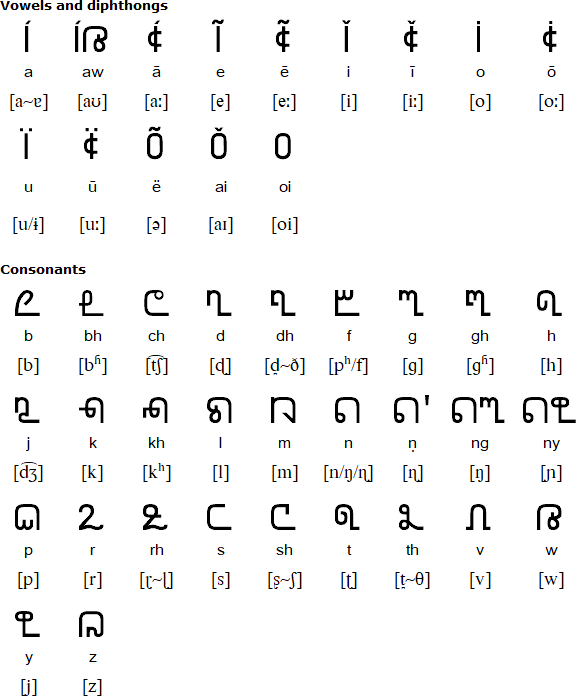The Coorgi-Cox alphabet was developed in 2005 by a German linguist, Gregg M. Cox, as a new way to write Kodava, a Dravidian language spoken in Karnataka state in southern India. The alphabet was developed in response to a request from Kodava speakers for a unique alphabet to write their language. The Coorgi-Cox alphabet provides a single writing system for all Kodava speakers, and was introduced with CDs and postcards in March and April 2005.

Download an alphabet chart for Coorgi-Cox (Excel)
Download a Coorgi-Cox font
Details of the Coorgi-Cox alphabet provided by Wolfram Siegel (PDF)
Information about Kodava | Kodava Lipi | Coorgi-Cox alphabet | Numbers
Information about the Coorgi-Cox alphabet
http://en.wikipedia.org/wiki/Coorgi-Cox_alphabet
http://std.dkuug.dk/jtc1/sc2/wg2/docs/n4287.pdf
https://www.goheritagerun.com/kodava-in-coorg-endangered-language-comes-alive/
A-chik Tokbirim, Adinkra, ADLaM, Armenian, Avestan, Avoiuli, Bactrian, Bassa (Vah), Beitha Kukju, Beria (Zaghawa), Borama / Gadabuursi, Carian, Carpathian Basin Rovas, Chinuk pipa, Chisoi, Coorgi-Cox, Coptic, Cyrillic, Dalecarlian runes, Elbasan, Etruscan, Faliscan, Fox, Galik, Georgian (Asomtavruli), Georgian (Nuskhuri), Georgian (Mkhedruli), Glagolitic, Global Alphabet, Gothic, Greek, Hurûf-ı munfasıla, Irish (Uncial), Kaddare, Kayah Li, Khatt-i-Badí’, Khazarian Rovas, Koch, Korean, Latin, Lepontic, Luo Lakeside Script, Lycian, Lydian, Manchu, Mandaic, Mandombe, Marsiliana, Medefaidrin, Messapic, Mongolian, Mro, Mundari Bani, Nag Chiki, Naasioi Otomaung, N'Ko, North Picene, Novo Tupi, Nyiakeng Puachue Hmong, Odùduwà, Ogham, Old Church Slavonic, Oirat Clear Script, Ol Chiki (Ol Cemet' / Santali), Old Italic, Old Nubian, Old Permic, Ol Onal, Orkhon, Osage, Oscan, Osmanya (Somali), Pau Cin Hau, Phrygian, Pollard script, Runic, Székely-Hungarian Rovás (Hungarian Runes), South Picene, Sutton SignWriting, Sunuwar, Tai Viet, Tangsa, Todhri, Toto, Umbrian, (Old) Uyghur, Wancho, Yezidi, Zoulai
Page last modified: 15.03.23
[top]
You can support this site by Buying Me A Coffee, and if you like what you see on this page, you can use the buttons below to share it with people you know.

If you like this site and find it useful, you can support it by making a donation via PayPal or Patreon, or by contributing in other ways. Omniglot is how I make my living.
Note: all links on this site to Amazon.com, Amazon.co.uk
and Amazon.fr
are affiliate links. This means I earn a commission if you click on any of them and buy something. So by clicking on these links you can help to support this site.
[top]